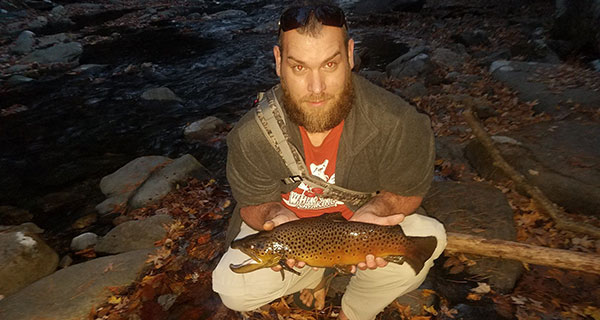It’s fall, and the Delayed Harvest Season is upon us in North Carolina. This is the time of year that most of us have been preparing for this last month. I know I have been daydreaming of throwing something big and ugly in a deep pool, and holding on for dear life. The great part is that all North Carolina Delayed Harvest Streams are stocked alike.
Stocked trout can act completely different from wild trout. Stocked trout are used to someone throwing food pellets out to them. They have never seen rocks, current, or even some of the different bugs. Everything is foreign to them. They usually lack muscle mass to fight heavy current for very long. That is the reason you will find a lot of stocked trout in deep pools or slow runs.
Stocked trout can also be very territorial and aggressive the first few weeks. Bright colorful flies, or flies with a lot of movement can produce some really nice fish. My “go to” is a bright nymph (usually) right on the bottom. If you can bounce it along the bottom and bump their nose with it, you can almost guarantee a bite. Weight is your best bet when it comes to getting your fly on the bottom.
The weight of your rod and line correspond to the size and weight of the fly you’re throwing, not the size of fish you are catching. If you need to throw heavier flies or split shot, remember to use a heavier weight rod. This allows a proper turn over and easier mending.
A major difference between stocked trout and wild trout is size. The average sized fish stocked in North Carolina Delayed Harvest is 12” to 16”, with a few bigger and littler ones thrown in. It is very common for me to be using a heavily weighted size 10 nymph. It allows me to reach the bottom really quick in fast water.
After trout have been caught a few times, they become more selective. They will still hold in the same places, but a Pheasant Tail can work better than an egg pattern. As trout become more familiar with hatches, dry flies can become very productive. Every stream fishes differently, no matter how many fish it holds. Don’t get frustrated if new water leaves you stumped, and don’t be afraid to try something different.
Next time you are fishing a North Carolina Delayed Harvest, don’t be afraid to pull out the 5 weight and throw something big and heavy, especially right after a stocking. Until next time, Tight Lines and Stable Rocks!
Justin Mickens is Co-Owner and Manager of Appalachian Outfitters Fly Shop in Murphy, NC.

